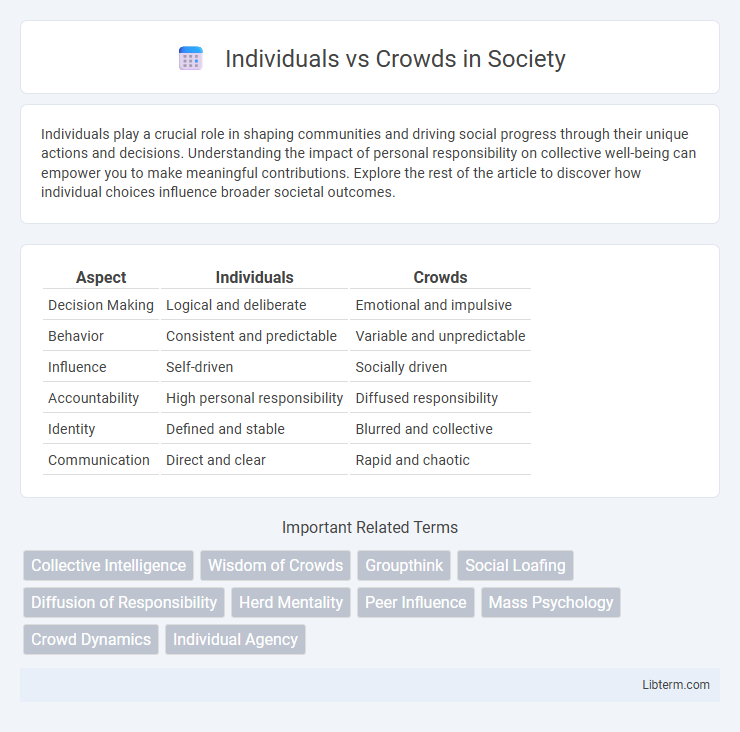Individuals play a crucial role in shaping communities and driving social progress through their unique actions and decisions. Understanding the impact of personal responsibility on collective well-being can empower you to make meaningful contributions. Explore the rest of the article to discover how individual choices influence broader societal outcomes.
Table of Comparison
| Aspect | Individuals | Crowds |
|---|---|---|
| Decision Making | Logical and deliberate | Emotional and impulsive |
| Behavior | Consistent and predictable | Variable and unpredictable |
| Influence | Self-driven | Socially driven |
| Accountability | High personal responsibility | Diffused responsibility |
| Identity | Defined and stable | Blurred and collective |
| Communication | Direct and clear | Rapid and chaotic |
Understanding Individuals and Crowds
Understanding individuals involves analyzing personal motivations, decision-making processes, and emotional responses that shape unique behavior patterns. Crowds exhibit collective behavior influenced by social dynamics, emotional contagion, and shared goals, often leading to actions distinct from individual intentions. Recognizing these differences aids in predicting group behavior and managing crowd responses effectively.
Psychological Differences Between Individuals and Crowds
Individuals exhibit unique cognitive processes, decision-making patterns, and emotional responses, enabling personalized judgment and self-control. In contrast, crowds often experience heightened suggestibility, reduced accountability, and amplified emotional contagion, leading to collective behavior that diverges from individual norms. Psychological studies highlight phenomena such as deindividuation and social facilitation as key factors distinguishing individual versus crowd dynamics.
Decision-Making: Solo Minds vs Collective Minds
Decision-making in individuals often relies on personal experience, intuition, and cognitive biases, which can lead to faster but potentially less informed choices. Collective minds, by aggregating diverse perspectives and knowledge, tend to produce more accurate and stable decisions through mechanisms like the wisdom of crowds and group deliberation. However, group dynamics such as conformity, groupthink, or social influence can sometimes impair collective decision quality, highlighting the trade-offs between solo and crowd-based cognition.
Social Influence: Conformity and Independence
Social influence plays a crucial role in shaping behavior within groups, where conformity often emerges as individuals align their actions and beliefs with majority norms to gain acceptance. This pressure to conform can suppress independence, leading to uniformity and reduced critical thinking, yet some individuals resist by maintaining personal beliefs despite group opposition. Balancing conformity and independence is essential for healthy social dynamics, as it fosters both cohesion and innovation within communities.
Advantages of Individual Thinking
Individual thinking promotes creativity by allowing unique perspectives to flourish without the constraints of group conformity. Personal accountability enhances decision-making quality, as individuals take ownership of outcomes and are motivated to analyze situations critically. Independent thought also accelerates problem-solving by enabling swift, uninfluenced judgments, often leading to innovative solutions.
Benefits of Crowd Wisdom
Crowd wisdom leverages diverse perspectives, resulting in more accurate and reliable decisions compared to individual judgments. Aggregated input from large groups reduces biases and errors, enhancing problem-solving and innovation. This collective intelligence proves especially effective in complex scenarios requiring varied expertise and information.
Risks of Groupthink and Herd Mentality
Groupthink and herd mentality increase the risk of poor decision-making within crowds by discouraging dissent and critical thinking, often leading to irrational or risky behaviors. Individuals may feel pressured to conform to the majority opinion, resulting in a loss of personal accountability and creativity. This psychological dynamic can cause collective errors in judgment, amplifying potential negative consequences in business, politics, and social movements.
Innovation: Lone Geniuses vs Collaborative Teams
Innovation driven by lone geniuses often stems from unique, unshared insights that challenge conventional thinking, enabling breakthrough inventions. Collaborative teams leverage diverse expertise, combining multiple perspectives that enhance creativity, problem-solving, and iterative improvement. Research shows that while solitary innovation can spark original ideas, sustained innovation typically thrives in collaborative environments fostering collective intelligence and knowledge exchange.
Real-World Examples: Individuals vs Crowds in Action
In real-world scenarios, individuals often demonstrate unique problem-solving skills and innovation, such as Elon Musk revolutionizing the electric vehicle industry through Tesla. Crowds, exemplified by platforms like Wikipedia, harness collective intelligence to compile vast amounts of information with diverse input. However, crowds can sometimes fall prey to groupthink, as seen in financial market bubbles where herd behavior leads to irrational investment decisions.
Balancing Individual Agency and Collective Power
Balancing individual agency and collective power requires recognizing the unique contributions of personal innovation alongside the amplified impact of group collaboration. Effective social movements harness individual creativity and leadership while fostering cohesive teamwork that drives larger societal change. Optimizing this balance enhances democratic participation and sustainable community development.
Individuals Infographic

 libterm.com
libterm.com